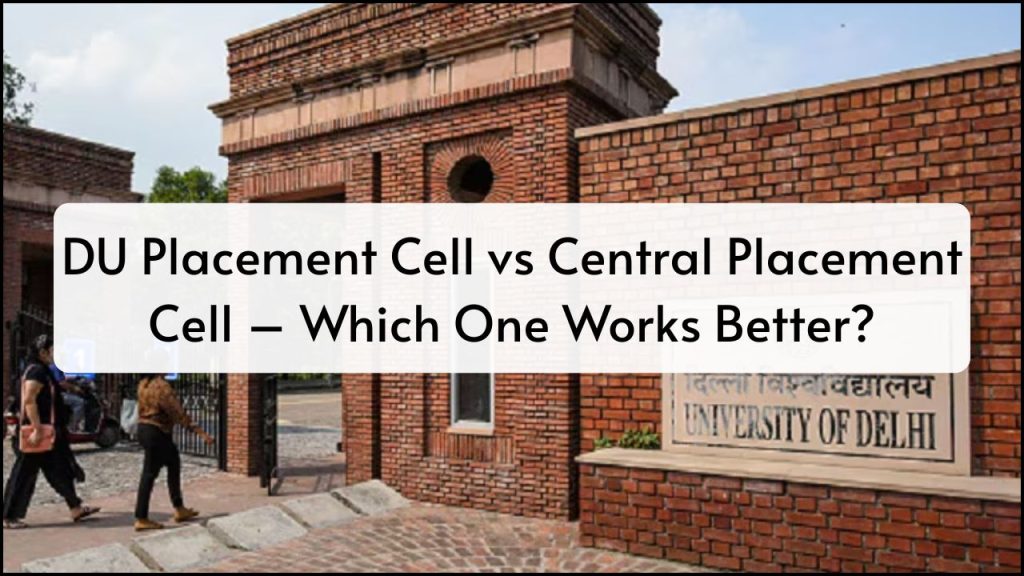
In the competitive world of university placements, Delhi University (DU) offers its students a mix of opportunities through both college-level placement cells and a centralized body called the Central Placement Cell (CPC). While both aim to bridge the gap between academia and industry, they differ significantly in approach, efficiency, and results.
This article takes a deep dive into comparing the DU College Placement Cells and the DU Central Placement Cell, analyzing their structure, effectiveness, roles, and outcomes, helping you decide which one truly works better for UG and PG students.
Table of Contents
Understanding DU’s Placement Structure
Delhi University has a dual-tier placement system:
- College Placement Cells (CPCs) – Operate independently within each DU college (e.g., SRCC, Hindu, Miranda House, etc.)
- Central Placement Cell (DU-CPC) – Operates at the university level under the administration of DU to support students from all colleges.
Both offer placement and internship opportunities but differ in accessibility, reach, and specialization.
Key Differences at a Glance
| Feature | DU College Placement Cells | DU Central Placement Cell (DU-CPC) |
|---|---|---|
| Operated by | Individual Colleges | University of Delhi (Central Body) |
| Target Students | Enrolled in that specific college | All DU students (Regular & SOL) |
| Recruiter Pool | College-specific networks | University-wide outreach |
| Selection Process | Tailored by college | Uniform recruitment process |
| Event Types | Seminars, company visits, alumni talks | Central job fairs, workshops, online drives |
| Accessibility | Exclusive to college students | Open to students from all DU colleges |
| Success Rate | Higher in top-tier colleges | Moderate but inclusive |
DU College Placement Cells
Every major college in Delhi University runs its autonomous placement cell. These cells directly contact companies, organize placement drives, and tailor career development activities to their students’ academic strengths.
Key Functions:
- Organizing on-campus interviews.
- Resume-building and interview training workshops.
- Alumni interactions and career seminars.
- Managing internships and live projects.
Notable Placement Cells:
| College | Placement Cell Name | Notable Recruiters |
|---|---|---|
| SRCC | The SRCC Placement Cell | Deloitte, BCG, EY, McKinsey |
| Hindu College | Disha | Bain, KPMG, Teach for India |
| Miranda House | Career & Placement Cell | EY, ZS Associates, Genpact |
| Hansraj College | Hansraj Placement Cell | PwC, Google, Accenture |
Pros:
- Strong alumni and recruiter base.
- Higher placement packages.
- Specific to student interest and academic strengths.
Cons:
- Only accessible to students of that particular college.
- Quality varies across colleges – top-tier colleges dominate.
DU Central Placement Cell (DU-CPC)
The Central Placement Cell (CPC) is run by the University of Delhi for all regular students as well as those from the School of Open Learning (SOL) and Non-Collegiate Women’s Education Board (NCWEB).
Key Functions:
- Acts as a unified platform for companies to hire from across DU.
- Conducts centralized job fairs, webinars, and placement drives.
- Partners with NGOs, startups, and MNCs for mass recruitment.
Registration:
All interested students must register online with the CPC portal, upload their resume, and stay updated through emails or the CPC dashboard.
| Activity | Frequency/Availability |
|---|---|
| Registration Period | Once per academic year |
| Placement Drives | Monthly or Quarterly |
| Internship Opportunities | Regularly updated online |
| Training Programs Offered | Interview prep, resume writing |
Pros:
- Inclusive of students from all colleges, including off-campus units.
- Open to students who may not have a college placement cell.
- Consistent updates and large-scale drives.
Cons:
- Lesser-known companies visit.
- Packages are usually lower than college cells.
- Slower recruitment turnaround.
Placement Record Comparison
Placement Metrics (2023-24):
| Metric | College Placement Cells (Top 10 Colleges) | DU-Central Placement Cell (All Colleges) |
|---|---|---|
| Average Package | ₹6–9 LPA | ₹3–4.5 LPA |
| Highest Package | ₹35 LPA (SRCC) | ₹10 LPA |
| Major Recruiters | Deloitte, BCG, KPMG, Google | Genpact, Concentrix, Byju’s, Lenskart |
| Participation Rate | 60–80% (college-specific) | 30–50% (across DU) |
| Most Common Sectors | Finance, Consulting, Analytics, Media | Sales, Operations, BPO, Entry-Level Roles |
As is visible, the college-specific placement cells outperform CPC in terms of average salary and recruiter quality. However, CPC is more accessible for students across various academic streams, especially those in off-campus or distance learning modes.
Student Experience & Accessibility
| Factor | College Placement Cells | DU-Central Placement Cell |
|---|---|---|
| Ease of Registration | Managed by college admin | Online portal, self-managed |
| Student Guidance & Training | Personal attention in workshops | Generic online sessions |
| Accessibility for SOL/NCWEB | Not available | Fully accessible |
| Inclusivity across streams | Focused on mainstream courses | Open to all streams |
| Responsiveness to Queries | Faster due to smaller scale | Slower due to mass participation |
Students from non-mainstream courses, like Hindi Honours or Philosophy, often struggle to get placements through college cells. For them, the Central Placement Cell becomes a crucial platform.
Internship Opportunities
Internships form a key stepping stone in the student’s career. Both placement setups offer internship assistance, but the college placement cells tend to have better-quality internships with stipends and brand names, especially in the top colleges.
The CPC focuses more on volume and mass outreach, providing internships from startups and NGOs.
| Internship Type | DU College Placement Cells | DU Central Placement Cell |
|---|---|---|
| Corporate Internships | Yes – MNCs, Big 4 | Few – Mostly startups/SMEs |
| Research Internships | Yes – via faculty links | Rare |
| NGO/Community Work | Moderate | High focus |
| Paid Internships | Mostly Yes | Few are unpaid or low stipend |
Which One Works Better?
The answer depends on where you’re studying and what you’re aiming for.
| Student Type | Better Option |
|---|---|
| Student at Top DU College (SRCC etc) | College Placement Cell |
| Student from Regular College | Try Both |
| Student from SOL/NCWEB | DU Central Placement Cell |
| Looking for Professional Exposure | College Placement Cell |
| Seeking General Job Assistance | DU Central Placement Cell |
If you are enrolled in top DU colleges like SRCC, Hindu, or Miranda House, the college placement cell will offer better packages and reputed recruiters. However, if you’re from an average or off-campus college, registering with the DU-CPC gives you more opportunities and wider exposure.
Final Notes
Both placement systems have their own set of strengths and weaknesses. Ideally, students should leverage both platforms to maximize their chances. While college cells may give you high-profile jobs, CPC can help secure internships and backup opportunities, especially useful in uncertain job markets.





